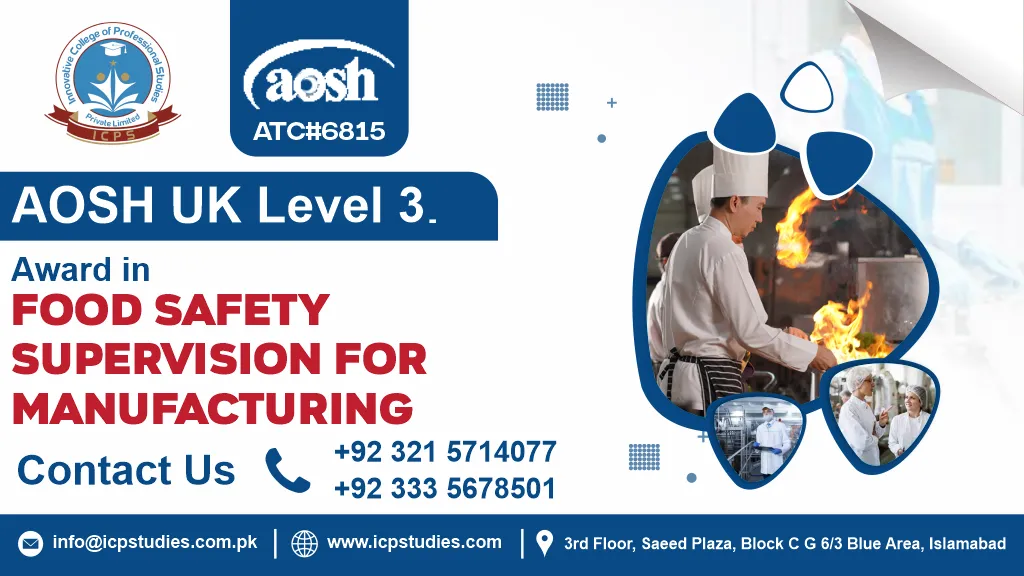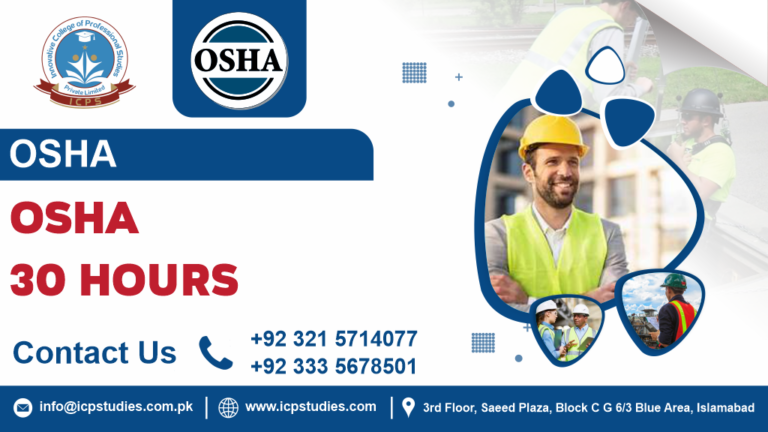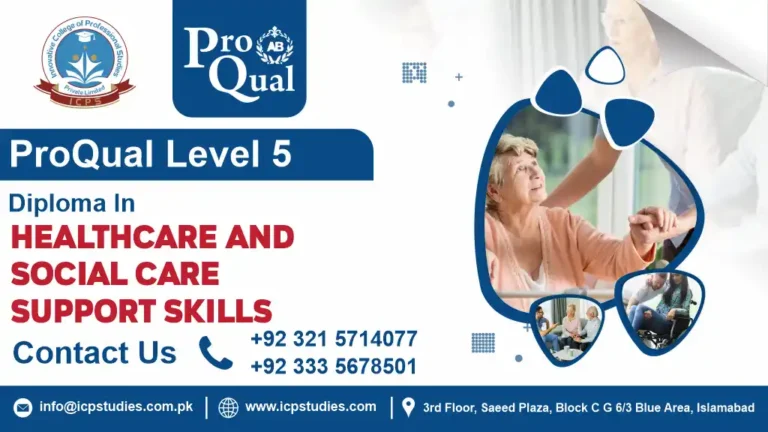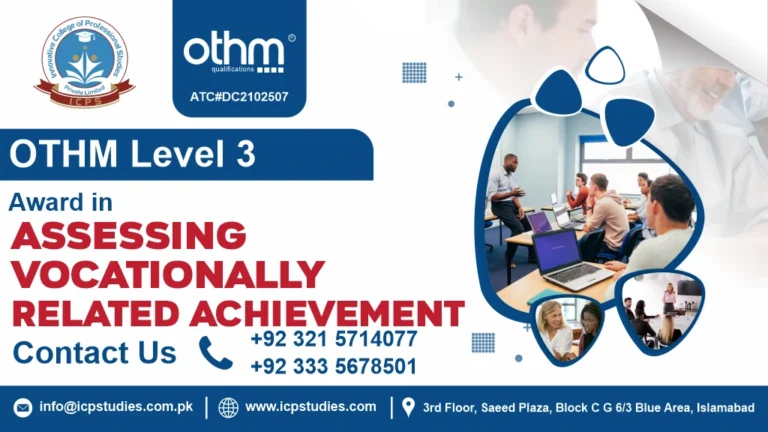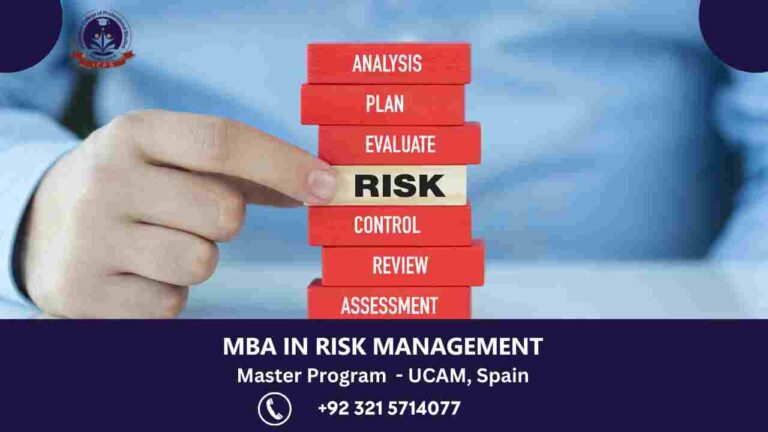Embark on a transformative journey at the forefront of food manufacturing excellence through the AOSH UK Level 3 Award in Food Safety Supervision. This isn’t merely a certification; it’s your gateway to mastering the nuanced intricacies of food safety within the manufacturing sector. Let’s immerse ourselves in the captivating realm of this qualification, meticulously crafted to not only captivate your interest but also to empower and elevate your career in food safety supervision.
In the dynamic landscape of food manufacturing, the role of supervision is paramount in ensuring safety standards go beyond mere compliance to reach unprecedented levels. The AOSH UK Level 3 Award is your exclusive pass into this realm of heightened responsibility and leadership. Whether you’re a seasoned professional with years of experience or an aspiring supervisor taking your first steps, this program is intricately designed to amplify your knowledge, sharpen your skills, and magnify your impact within the manufacturing sector.
Picture a scenario where your role transcends routine oversight to embody true leadership in food safety. This award serves as a compass guiding you toward that future, where each module is a stepping stone towards excellence and each lesson is a catalyst for creating a safer, more resilient manufacturing environment.
Intrigued to be part of this transformative experience? Dive into the details of the AOSH UK Level 3 Award in Food Safety Supervision on our website. Whether you’re a seasoned professional looking to enhance your expertise or a rising star eager to make your mark, this program is tailored to propel you toward success.
Enroll today, and together, let’s embark on a journey where your dedication meets our commitment to shaping the future of food safety supervision in manufacturing. The spotlight awaits you!
All About AOSH UK Level 3 Award in Food Safety Supervision for Manufacturing
Course Overview
The AOSH UK Level 3 Award in Food Safety Supervision for Manufacturing stands as a distinguished certification program meticulously tailored for professionals aiming to excel in the pivotal role of food safety supervision within the manufacturing sector. Going beyond standard certifications, this program serves as a comprehensive roadmap, empowering individuals to master the complexities and intricacies associated with ensuring the highest standards of food safety in manufacturing environments.
Distinguishing itself from conventional certifications, the Level 3 Award doesn’t merely skim the surface but delves deeply into the nuances of food safety supervision. It acts as a guiding light for individuals, providing them with a holistic understanding of the intricacies involved in safeguarding food safety throughout manufacturing processes. This program isn’t just about meeting compliance; it’s about achieving mastery, offering a transformative educational experience that shapes individuals into adept leaders in the field.
From hazard analysis to risk management, the curriculum is meticulously crafted to encompass every relevant facet of food safety within the manufacturing sector. The emphasis on practical application ensures that participants not only grasp theoretical concepts but also acquire the skills to effectively implement and oversee these principles in real-world manufacturing settings.
Global recognition adds an additional layer of distinction to the Level 3 Award, acknowledging individuals’ commitment to excellence in food safety supervision on an international scale. As participants progress through the program, they are equipped not only with knowledge but also with the leadership skills necessary for advancing food safety practices within the intricate and demanding landscape of manufacturing.
In essence, the AOSH UK Level 3 Award transcends being a mere certification; it’s an empowering educational journey that propels professionals toward mastery in food safety supervision, ultimately contributing to elevated standards and a culture of excellence within the manufacturing sector.
Learning Outcomes
- Comprehensive Understanding of Food Safety Principles: Develop a thorough comprehension of food safety principles, including hazard analysis, risk assessment, and critical control points (HACCP), specific to the manufacturing environment.
- Application of Regulatory Standards: Gain the ability to interpret and apply relevant food safety regulations and standards within the manufacturing sector, ensuring compliance with industry requirements.
- Effective Hazard Analysis and Risk Management: Acquire skills in conducting comprehensive hazard analysis and risk assessments, identifying potential hazards associated with food manufacturing processes, and implementing effective risk management strategies.
- Leadership in Food Safety Supervision: Cultivate leadership skills essential for effective food safety supervision. Learn to lead teams, instill a culture of safety, and communicate and enforce food safety protocols within the manufacturing setting.
- Practical Implementation of Food Safety Measures: Translate theoretical knowledge into practical application. Develop the ability to implement and oversee food safety measures, ensuring the highest standards are maintained throughout the manufacturing processes.
- Effective Communication in a Manufacturing Setting: Enhance communication skills tailored to the manufacturing environment. Learn to communicate food safety protocols clearly and effectively to diverse teams, fostering understanding and compliance.
- Continuous Improvement and Adaptability: Instill a mindset of continuous improvement in food safety practices. Develop the ability to adapt to evolving challenges within the manufacturing sector, staying ahead of emerging trends and technologies.
- Team Collaboration and Training: Foster collaboration within teams by developing effective communication and training strategies. Learn to train and guide staff in adhering to food safety protocols, creating a unified approach to safety within the manufacturing environment.
- Crisis Management Proficiency: Develop proficiency in crisis management specific to food safety incidents. Acquire the skills to respond swiftly and effectively to crises, minimizing potential risks and ensuring the continuity of safe manufacturing processes.
- Global Perspective on Food Safety: Gain a global perspective on food safety practices, recognizing international standards and best practices. Understand the implications of global regulations and their impact on the manufacturing sector.
- Networking and Professional Development: Develop networking skills within the food safety and manufacturing industries. Connect with professionals, industry experts, and mentors, fostering continuous learning, knowledge exchange, and professional development.
Admission Criteria
- Educational Qualifications: Prospective participants are typically required to have a foundational educational background, often holding a minimum of a high school diploma or an equivalent qualification. Some programs may specify additional educational prerequisites or preferences, such as relevant coursework in food science, technology, or a related field.
- Professional Experience: Participants are expected to have practical experience in the food manufacturing industry. This may include roles related to food safety, quality control, or manufacturing supervision. The admission criteria often specify a minimum number of years of relevant work experience.
- Language Proficiency: Participants are typically required to demonstrate proficiency in the language of instruction, which is often English. This may be assessed through standardized language proficiency tests or other recognized language qualifications.
Ideal Candidate
- Educational Background: An ideal candidate typically holds a relevant academic qualification, such as a degree in food science, food technology, or a related field. Additional certifications or coursework in food safety are advantageous.
- Professional Experience: The candidate should have a substantial background in the food manufacturing industry, preferably with a few years of experience in roles related to food safety, quality assurance, or a comparable field. Supervisory or managerial experience is highly valued.
- Prior Training in Food Safety: Candidates with previous training or certifications in food safety, HACCP (Hazard Analysis and Critical Control Points), or related areas demonstrate a strong foundation in the principles that the Level 3 Award builds upon.
- Leadership Potential: The ideal candidate exhibits leadership potential and a willingness to take on increased responsibilities. Whether already in a supervisory role or aspiring to move into one, the candidate should showcase the ability to lead and inspire teams.
- Commitment to Continuous Learning: An ideal candidate is committed to ongoing professional development and continuous learning. This includes staying informed about the latest trends, regulations, and advancements in food safety within the manufacturing sector.
- Analytical and Critical Thinking Skills: Strong analytical and critical thinking skills are essential for effective food safety supervision. The candidate should be capable of assessing complex situations, conducting risk analyses, and making informed decisions in a manufacturing context.
- Excellent Communication Skills: Effective communication is crucial in a supervisory role. The ideal candidate can articulate ideas clearly, communicate food safety protocols to diverse teams, and facilitate understanding and compliance among team members.
- Problem-Solving Ability: The candidate should demonstrate a proactive approach to problem-solving. The ability to identify, analyze, and resolve challenges related to food safety within the manufacturing environment is a key attribute.
- Global Awareness: Given the international recognition of the AOSH UK certification, an ideal candidate may possess a global perspective. Awareness of international food safety standards and an understanding of how global regulations impact manufacturing practices enhance the candidate’s suitability.
- Ethical Conduct: Upholding the highest standards of ethical conduct is non-negotiable. The ideal candidate exhibits integrity, honesty, and a commitment to ethical practices in food safety supervision.
- Team Collaboration Skills: Collaboration is vital in a manufacturing setting. An ideal candidate should showcase the ability to collaborate effectively with diverse teams, fostering a cooperative and safety-focused work environment.
Key Takeaways
Study Units
- Unit 1: Introduction to Food Safety in Manufacturing
- Overview of food safety principles in manufacturing.
- Introduction to relevant regulations and standards.
- Importance of food safety supervision in the manufacturing context.
- Unit 2: Hazard Analysis and Risk Assessment
- In-depth exploration of hazard analysis methodologies.
- Comprehensive risk assessment techniques specific to manufacturing processes.
- Identification and prioritization of critical control points.
- Unit 3: Legal and Regulatory Frameworks
- Examination of local and international food safety regulations.
- Understanding legal obligations and compliance requirements within the manufacturing sector.
- Implications of non-compliance and enforcement mechanisms.
- Unit 4: Leadership and Communication Skills
- Development of leadership skills tailored to food safety supervision.
- Effective communication strategies within a manufacturing setting.
- Building and leading teams to enforce food safety protocols.
- Unit 5: Practical Implementation of Food Safety Measures
- Application of theoretical knowledge to real-world manufacturing scenarios.
- Oversight and implementation of food safety measures throughout the manufacturing processes.
- Case studies and practical exercises.
- Unit 6: Crisis Management in Food Safety
- Proficiency in crisis management specific to food safety incidents.
- Development of response strategies to minimize risks during crises.
- Ensuring the continuity of safe manufacturing processes during emergencies.
- Unit 7: Continuous Improvement and Adaptability
- Cultivation of a mindset of continuous improvement in food safety practices.
- Adaptation to evolving challenges within the manufacturing sector.
- Staying informed about emerging trends and technologies in food safety.
- Unit 8: Global Perspective on Food Safety
- Recognition of international standards and best practices in food safety.
- Understanding the global impact of regulations on the manufacturing sector.
- Implications of global trends and advancements on local manufacturing processes.
- Unit 9: Team Collaboration and Training
- Fostering collaboration within teams through effective communication.
- Developing training strategies for staff to ensure adherence to food safety protocols.
- Creating a unified approach to safety within the manufacturing environment.
- Unit 10: Networking and Professional Development
- Building networking skills within the food safety and manufacturing industries.
- Connecting with professionals, industry experts, and mentors.
- Continuous learning, knowledge exchange, and opportunities for professional development.
FAQs for AOSH UK Level 2 Award in Food Safety Manufacturing

